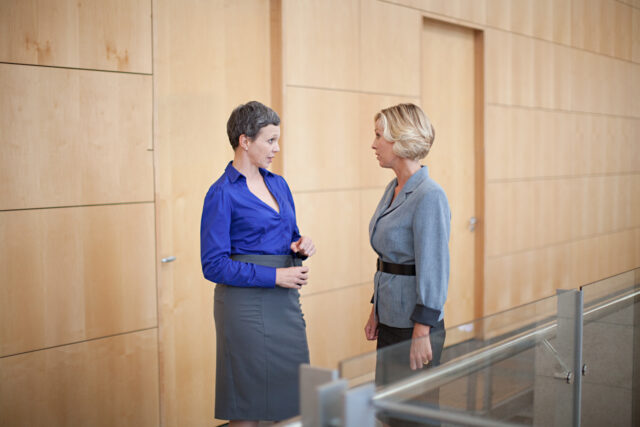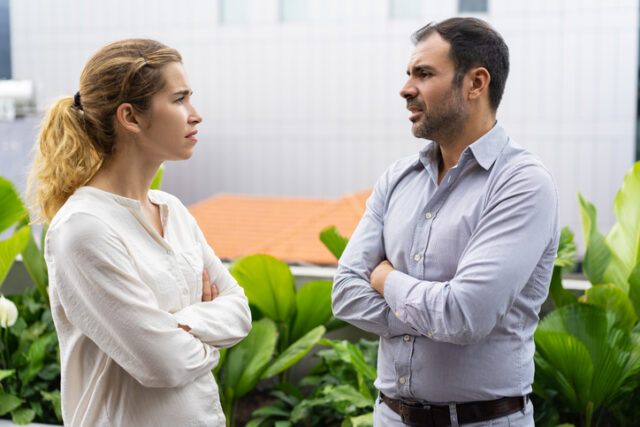When things get heated, we’re all guilty of letting our emotions get the better of us and reacting in ways we’re not all that proud of once we’ve cooled off a bit.

Of course, just because you said something you didn’t mean or overreacted to a situation that wasn’t that big of a deal doesn’t make you a bad person. It just means you’re human. Here’s how to get back on track and make up for your misstep.
1. “I realise I overreacted, and I’d like to discuss it calmly.”

Nothing will make a person more receptive to hearing you out than taking responsibility for your actions. Owning up to the fact that you were out of line goes a long way towards reopening the lines of communication and making amends.
2. “I acted on impulse, and I regret not taking a moment to think it through.”

Admitting that you acted hastily shows maturity and the ability to reflect on your behaviour. It also implies that you understand the value of pausing before reacting, which can reassure the other person that you’re committed to improving your communication skills.
3. “My words didn’t accurately reflect my thoughts or feelings, and I’d like to explain.”

Sometimes our immediate reactions don’t truly represent our deeper feelings or beliefs. Saying this acknowledges the disconnect between your outburst and your genuine thoughts, meaning you can continue the conversation more calmly, and in a way that actually reflects your true feelings.
4. “I allowed my past experiences to colour my reaction, and that wasn’t fair to you.”

Saying this shows emotional intelligence because it proves that you recognise how past events can influence current behaviours. It also shows empathy towards the other person, acknowledging that they shouldn’t be held responsible for your emotional baggage.
5. “I’m embarrassed by how I behaved, and I want to make things right.”

Expressing genuine embarrassment can be disarming and help break the tension. By following it up with a desire to fix the problem, you’re showing that you value the relationship and are willing to put in the effort to repair any damage caused by your poor reaction.
6. “I misunderstood the situation, and I jumped to conclusions too quickly.”

Again, here you’re taking responsibility for your knee-jerk judgement while also opening the door for clarification. You’re also giving the other person space to share their perspective, which could clear up the misunderstandings that led you to overreact in the first place.
7. “I let my frustration get the best of me, and I shouldn’t have taken it out on you.”

Acknowledging that your emotions overwhelmed you shows vulnerability and self-awareness. By explicitly stating that the other person didn’t deserve to be the target of your frustration, you’re taking full responsibility for your actions. Again, talk about high EQ!
8. “I realise now that I was projecting my own insecurities onto you, and that wasn’t right.”

This level of introspection can be really powerful not just for yourself, but for the relationship you have with the other person. By recognising and admitting that your own insecurities played a role in your reaction, you’re showcasing your emotional maturity and a willingness to address the root causes of your behaviour.
9. “I should have communicated my feelings more clearly instead of lashing out.”

This shows that you understand the importance of effective communication. It also implies a commitment to expressing yourself more constructively in the future, which can help rebuild trust and prevent similar blow-ups from happening again in the future.
10. “I was feeling overwhelmed, but that’s no excuse for how I treated you.”

While it’s important to explain the context of your reaction, saying this makes it clear that you’re not using it as an excuse. It shows that you understand the impact of your behaviour on other people, regardless of your personal circumstances. That’s important!
11. “I value our relationship too much to let this incident damage it.”

Letting the other person know that you value their presence in your life even though your reaction didn’t show that is really important. It makes it clear that you’re committed to moving forward with them and that you see the drama you had as an opportunity for growth rather than a reason for distance.
12. “I’d like to hear your perspective on what happened and how my reaction affected you.”

Giving the other person a chance to speak up proves that you’re genuinely interested in understanding the other person’s point of view. It showcases a lot of empathy and a willingness to listen, which are vital steps in resolving issues and preventing them from cropping up again in the future.
13. “I’m working on managing my emotions better, and I appreciate your patience.”

Acknowledging that you’re actively trying to improve shows commitment to personal growth. By letting them know how grateful you are for their patience, as well, you’re also recognising the impact your behaviour has on the people you care about, and the effort it takes to maintain relationships through tough moments.
14. “I reacted defensively because I felt attacked, but I now realise that wasn’t your intention.”

This shows that you’ve reflected on the reasons behind your reaction and have gained a new perspective on the situation. It opens up a conversation about intentions versus impact, which can lead to better understanding on both sides.
15. “I let my ego get in the way of listening to what you were really saying.”

Admitting that your ego played a role in your poor reaction takes a high level of self-awareness. It also implies a commitment to being more open-minded and receptive in future interactions, which can really improve the communication in your relationship.
16. “I’m sorry for my behaviour, and I’d like to know how I can make amends.”

This straightforward apology, coupled with a request for guidance on how to make things right, shows genuine remorse and a desire to repair the relationship. It puts the ball in the other person’s court, allowing them to express what they need to move forward positively.




